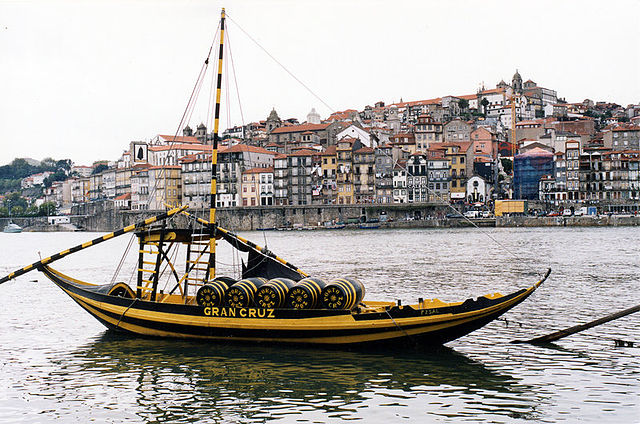Portuguese wine was mostly introduced by the Romans and other ancient Mediterranean peoples who traded with local coastal populations, mainly in the South. In pre-Roman Gallaecia-Lusitania times, the native peoples only drank beer and were unfamiliar with wine production. Portugal started to export its wines to Rome during the Roman Empire. Modern exports developed with trade to England after the Methuen Treaty in 1703. From this commerce a wide variety of wines started to be grown in Portugal. In 1758, one of the first wine-producing regions of the world, the Região Demarcada do Douro was created under the orientation of Marquis of Pombal, in the Douro Valley. Portugal has two wine-producing regions protected by UNESCO as World Heritage: the Douro Valley Wine Region and Pico Island Wine Region. Portugal has a big variety of local kinds, producing a very wide variety of different wines with distinctive personality.

The traditional rabelo boat, used to transport Port Wine from the Douro Valley to the cellars near the city of Porto.
"cupa", Roman tombstones in the shape of wine barrels, were used in the 3rd century AD in Alentejo, Museu de Évora
Vineyards in Vinho Verde Demarcated Region in Minho, Portugal
A glass of tawny port
Ancient Rome played a pivotal role in the history of wine. The earliest influences on the viticulture of the Italian peninsula can be traced to ancient Greeks and the Etruscans. The rise of the Roman Empire saw both technological advances in and burgeoning awareness of winemaking, which spread to all parts of the empire. Rome's influence has had a profound effect on the histories of today's major winemaking regions in France, Germany, Italy, Portugal and Spain.
A Roman statue of Bacchus, god of wine (c. 150 AD, copied from a Hellenistic original, Prado Museum, Madrid).
A painted Lararium (shrine) depicting Mercury (god of commerce) and Bacchus (god of wine) in Pompeii, in one of the hot-food establishments (thermopolia) that served the city prior to its destruction.
Ancient Roman amphoras in Pompeii
The 'Foro Boario' vineyard at Pompeii, replanted as it was at the time of the eruption, with small wine press in structure at back.








